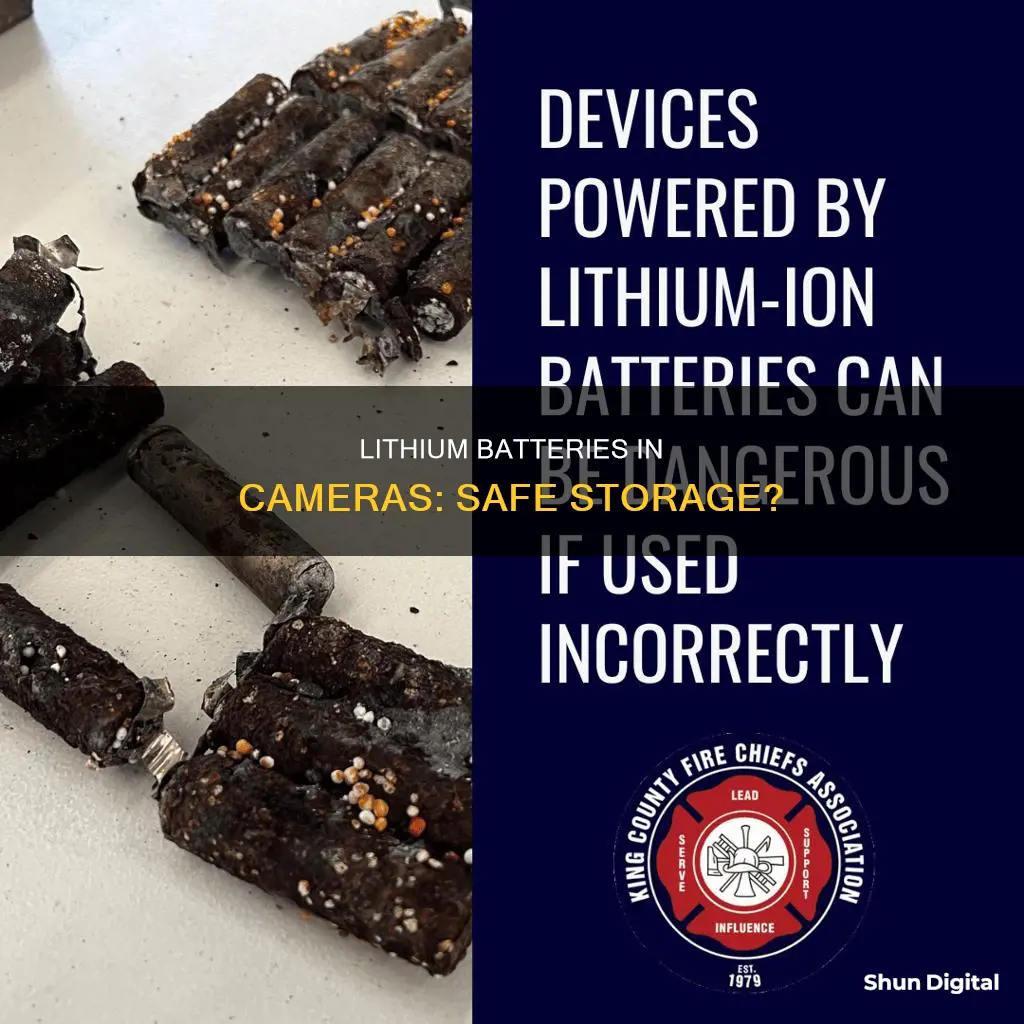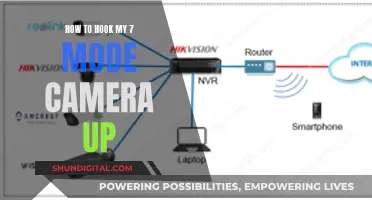
Leaving lithium batteries in cameras is a controversial topic. Some people believe that it is safe to leave lithium batteries in cameras for a short period of time, while others argue that it is not worth the risk due to the potential dangers. Lithium-ion batteries are known for their long lifespan, exceptional runtime, and fast-charging capabilities, but they can also be volatile, with the potential to overheat, expand, and even catch fire if not handled properly.
The consensus seems to be that leaving lithium batteries in cameras for a week or two is generally safe, but if the camera will be unused for six months to a year, it is recommended to remove them. Additionally, it is important to choose the right type of battery, store it in a cool, dry place, and monitor the battery level to ensure it doesn't drop too low. Proper charging and the use of protective cases are also essential for maintaining safety.
| Characteristics | Values |
|---|---|
| Safety | Leaving a lithium battery in a camera can be risky |
| Battery type | Li-ion batteries are the most common type used in cameras, but they are also the most volatile |
| Battery choice | Choose a battery with a high capacity and low discharge rate, and one that is designed for the camera model |
| Storage | Store the battery in a cool, dry place, away from direct sunlight or hot places |
| Battery level | Keep the battery level at or above 20% when not in use |
| Charging | Follow the manufacturer's instructions and ensure the charger is compatible with the battery |
| Protection | Use a protective case made of heat-resistant material such as silicone or neoprene |
| Usage | Leaving batteries in the camera for a week or two is fine; for longer periods, consider removing them |
| Charging equipment | Store charged batteries in small zip-lock bags or use the manufacturer's packaging to protect the terminals |
What You'll Learn
- Lithium batteries should be stored in a cool, dry place, away from direct sunlight
- Leaving lithium batteries in cameras for a week or two is fine, but for longer periods, they should be removed
- Lithium batteries should be monitored and not allowed to drop below 20% charge
- When charging lithium batteries, follow manufacturer instructions and use a compatible charger?
- Use a protective case to shield the battery from damage

Lithium batteries should be stored in a cool, dry place, away from direct sunlight
Leaving lithium batteries in cameras can be risky. Lithium-ion batteries are more volatile than other batteries and can overheat, expand, and even catch fire. This risk increases if the camera is left in direct sunlight or stored in a hot place. Therefore, it is important to store lithium batteries correctly when they are not in use.
- Temperature Control: Maintain a stable temperature between 20°C and 25°C (68°F to 77°F). Avoid extreme heat or cold, as high temperatures can cause internal expansion and increase the risk of fire, while extremely cold temperatures can reduce the battery's ability to hold a charge.
- Avoid Direct Sunlight: Do not expose lithium batteries to direct sunlight. Sunlight can cause the battery to overheat and potentially damage its structure.
- Moisture Control: Keep the batteries in a dry environment to prevent corrosion of battery terminals and reduce the risk of short circuits. Use dehumidifiers or moisture-absorbing packets if necessary.
- Optimal Charge Level: Store lithium-ion batteries with a moderate charge level of around 40-60%. Storing them at full charge can put stress on their components, while completely discharging them before storage can cause irreversible damage.
- Safe Handling: Always handle batteries with clean, dry hands to prevent moisture contamination. Use non-conductive dividers when storing multiple batteries together to prevent accidental contact between terminals.
- Storage Environment: Store batteries in a well-ventilated, climate-controlled room or cabinet. Ensure the area has good air circulation to prevent heat buildup.
- Protection from Physical Damage: Use original packaging or specialized battery cases to protect the batteries from physical damage and short-circuiting.
- Regular Inspection: Periodically inspect stored batteries for any signs of swelling, leakage, or corrosion. Dispose of damaged batteries promptly and replace them if necessary.
- Follow Manufacturer Guidelines: Different lithium-ion batteries may have specific storage requirements outlined by their manufacturers. Familiarize yourself with these guidelines before storing your particular battery type.
By following these guidelines, you can ensure the safe and effective storage of lithium batteries, reducing the risk of overheating and extending their lifespan.
Polaroid Camera Battery Replacement: A Step-by-Step Guide
You may want to see also

Leaving lithium batteries in cameras for a week or two is fine, but for longer periods, they should be removed
Leaving lithium-ion batteries in cameras for a week or two is generally considered safe. However, for longer periods, it is recommended to remove them to ensure the batteries' longevity and prevent potential safety hazards.
Lithium-ion batteries are highly convenient due to their long lifespan, exceptional runtime, and fast-charging capabilities. Nonetheless, they require careful handling and storage to maintain their safety and effectiveness. One crucial aspect is avoiding extreme heat and humidity, as lithium-ion batteries are susceptible to thermal runaway, which can lead to fires and explosions. Therefore, it is essential to store them in moderate temperatures, away from direct sunlight or hot environments.
While leaving lithium-ion batteries in cameras for short periods is acceptable, extended idle time can cause a gradual discharge, reducing battery life. Additionally, certain camera models may have a battery monitoring system that continues to draw power even when the camera is off, further draining the battery. Therefore, removing the batteries when the camera is not in use for extended periods is advisable.
Furthermore, lithium-ion batteries should be monitored for any signs of ageing, such as swelling, as old batteries are more prone to deterioration, leakage, and overheating. Regular inspections and proper disposal of aged batteries are essential to maintaining safety.
In summary, while it is safe to leave lithium-ion batteries in cameras for a week or two, longer periods of inactivity may impact battery performance and safety. Removing the batteries during extended periods of non-use and storing them in a cool, dry place are recommended to ensure optimal battery health and prevent potential hazards.
Ejecting the Casio EX-Z1000 Battery: A Step-by-Step Guide
You may want to see also

Lithium batteries should be monitored and not allowed to drop below 20% charge
It is not safe to leave lithium batteries in cameras for extended periods of time. Lithium-ion batteries are more volatile than other types of batteries, and they can overheat, expand, and even catch fire. This can be especially dangerous if the camera is left in direct sunlight or stored in a hot place for an extended period of time. To ensure the safety of the lithium battery, it is important to choose the right type of battery, store it in a cool, dry place, and monitor the battery level. Additionally, it is important to follow the manufacturer's instructions when charging the battery and use a protective case.
Charging Camera Batteries: Portable Power Options
You may want to see also

When charging lithium batteries, follow manufacturer instructions and use a compatible charger
Leaving lithium batteries in cameras can be risky, as they are more volatile than other batteries and can overheat, expand, or catch fire. However, with proper care, the risk can be minimised. When it comes to charging lithium batteries, it is crucial to follow the manufacturer's instructions and use a compatible charger to ensure safety and maintain the battery's lifespan.
Lithium batteries, including lithium-ion (Li-ion) and lithium polymer (LiPo) batteries, have unique charging requirements. They require precise charging parameters, such as specific voltages and controlled currents, to prevent overcharging and overheating. Regular chargers designed for conventional batteries like NiMH or NiCd batteries may not meet these requirements and could damage the battery or pose safety hazards.
Dedicated lithium battery chargers offer enhanced safety features, such as precise charging algorithms, voltage and current regulation, and temperature monitoring. They also provide faster charging and are compatible with various lithium battery chemistries.
When charging lithium batteries, it is important to:
- Avoid overcharging: Remove the battery from the charger once it reaches its full charge level.
- Monitor temperature: Disconnect the battery if it becomes excessively hot during charging.
- Follow manufacturer guidelines: Refer to the instructions provided by the battery manufacturer for specific charging instructions and precautions.
- Do not modify chargers: Altering regular chargers to suit lithium batteries is strongly discouraged as it can compromise safety.
In summary, while it is technically possible to charge lithium batteries with a regular charger, it is not recommended due to the potential risks involved. Using a dedicated lithium battery charger ensures optimal charging parameters, enhances safety, and prolongs the battery's lifespan. Prioritising safety when charging lithium batteries is of utmost importance to protect yourself, your devices, and your investment.
Prolong Your Camera's Battery Life: Tips and Tricks
You may want to see also

Use a protective case to shield the battery from damage
Leaving a lithium battery in a camera can be risky, as they are highly volatile and can overheat, expand, or even catch fire. To mitigate this risk, it is advisable to use a protective case to shield the battery from damage. Here are some essential considerations when choosing and using a protective case:
- Material: Opt for a case made of heat-resistant material, such as silicone or neoprene. These materials can help absorb and protect the battery from extreme temperatures, reducing the risk of overheating and fire.
- Size: Ensure that the protective case is large enough to cover the entire battery. This comprehensive coverage will provide maximum protection against potential damage.
- Condition: Periodically inspect the protective case for any cracks or damage. A compromised case may not offer the intended level of protection, so it is important to replace it if any defects are identified.
- Spill Resistance: Consider using a spill-resistant case, especially if you intend to use the camera in environments where spills or moisture are possible. This added layer of protection can safeguard against accidental liquid damage.
- Extreme Temperatures: Avoid exposing your camera and its battery to extreme temperatures, whether hot or cold. Extreme heat can increase the risk of battery overheating and fire, while extreme cold can affect battery performance and life. Always store your camera and battery in a controlled, temperate environment.
- Ventilation: When using or charging the battery, ensure the work area is well-ventilated. Proper ventilation can help dissipate heat and reduce the risk of overheating.
- Safety Measures: Adhere to standard safety measures when handling batteries. This includes wearing appropriate protective gear, such as safety goggles and gloves, and avoiding contact between metal objects and battery terminals.
Storing Camera Batteries: Charged or Not?
You may want to see also
Frequently asked questions
Leaving lithium batteries in cameras can be risky, as they are more volatile than other batteries and can overheat, expand, and catch fire. However, with proper care, the risk can be minimised.
Lithium-ion batteries can be dangerous if exposed to extreme heat, humidity, overcharging, or impact damage. They should never be left in hot environments, such as direct sunlight, as this can trigger thermal runaway, which can lead to fires or explosions.
To safely leave lithium batteries in your camera, choose a high-capacity battery with a low discharge rate that is designed for your camera model. Always store the battery in a cool, dry place and monitor the battery level to ensure it doesn't drop too low. Follow the manufacturer's instructions for charging, and use a protective case to shield the battery from damage.
It is recommended to store lithium-ion batteries at a cool 15°C and to avoid leaving them unused for long periods, as this can impact their performance and lifespan. Regularly inspect your batteries for any signs of damage or swelling, and dispose of old or faulty batteries properly to reduce the risk of leaks, fires, or explosions.







